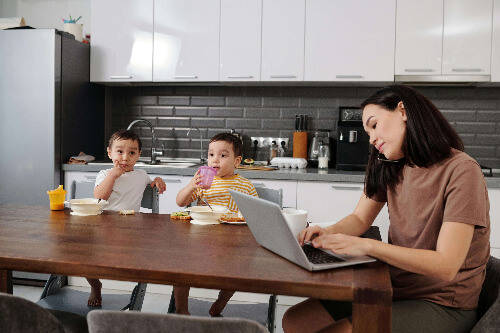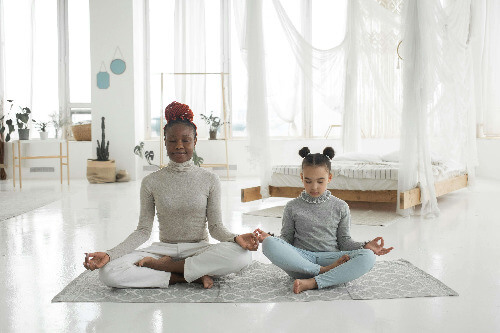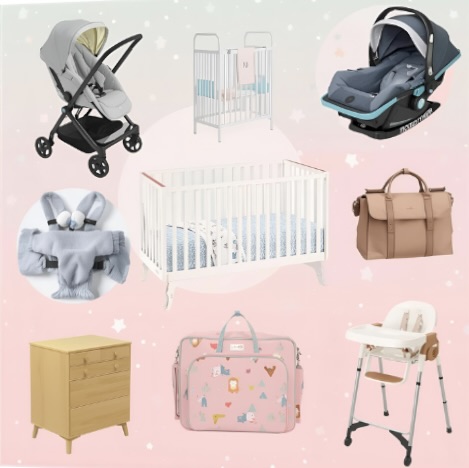Why Self-Care for Parents is the Secret to Better Parenting
As parents, you care for your children, manage a household and possibly juggle a career, you may often find yourself neglecting your own needs. This is where the concept of self care for parents comes into play.
 Mom is sitting at the table on laptop, while talking on the phone as her two children eat the meal that she has prepared for them.
Mom is sitting at the table on laptop, while talking on the phone as her two children eat the meal that she has prepared for them.Why is it Important to Take Care of Yourself?
Don’t think that you are being selfish or indulgent, because you’re not, you’re doing what’s necessary to maintain your health and well-being.
For parents, self-care is crucial because:
1. Mental Health:
Parenthood can be stressful, and chronic stress can lead to burnout, anxiety, and depression.
2. Physical Health:
You are constantly on the go and it can take a toll on your body.
3. Better Parenting:
When you take care of yourself, you are in a better position to care for your children. A well-rested, happy parent can provide the love and attention their children need.
4. Role Modeling:
When you emphasize self-care, you are setting a positive example for your children by teaching them the importance of taking care of themselves.
Simple Self-Care Practices for Busy Parents
Integrating self-care into your daily routine doesn't have to be time-consuming or expensive.
Here are some practical and manageable ways to practice self-care for parents:
1. Prioritize Sleep
Quality sleep is fundamental to overall health. Aim for 7-9 hours of sleep per night.
If your children’s sleep schedules disrupt your rest, try napping when they do, or consider taking turns with your partner for night duties.
2. Healthy Eating
Fueling your body with nutritious food is a key aspect of self-care. Plan meals that are balanced and include plenty of fruits, vegetables, whole grains, and lean proteins.
Ensure you have healthy options available and prepare meals in advance.
3. Physical Activity
One of the best ways to boost your energy levels, improve your mood and help you to sleep better is regular exercise.
It doesn’t have to be a rigorous workout; even a 20-minute walk, yoga session, or playing outside with your kids can make a significant difference.
 Woman and child sitting on mat and both are meditating.
Woman and child sitting on mat and both are meditating.4. Mindfulness and Relaxation
Taking a few minutes each day to practice mindfulness can help reduce stress and improve your mental clarity.
Try deep breathing exercises, meditation, or simply sitting in a quiet space to gather your thoughts.
5. Hobbies and Interests
Get involved in activities that give you joy and help you feel relaxed. Whether it’s reading a book, gardening, painting, or listening to music, taking time for your interests can rejuvenate your spirit.
6. Social Interactions
Maintaining social connections is important for emotional well-being. Make time to catch up with friends or family, even if it’s just a quick phone call or a virtual chat.
7. Ask for Help
Don’t be afraid to ask for help if you need it. Whether it’s from your partner, family members, friends, or professional services, seeking support can alleviate some of the pressures of parenting.
Overcoming Common Barriers to Self-Care
Many parents recognize the importance of taking care of themselves but struggle to implement self-care due to various barriers.
1. Guilt
You may feel guilty for taking time for yourself, but don’t, you want to be the best parent you can be? Think of it as a necessary investment in your family’s well-being.
2. Time Constraints
Busy schedules can make it seem impossible to find time for self-care. Try to include small self-care activities into your daily routine.
Just a few minutes here and there can add up to make a difference.
3. Lack of Support
If you lack a support network, consider joining parenting groups or online communities. Sharing experiences and advice with other parents can be incredibly supportive.
4. Financial Concerns
Self-care doesn’t have to be expensive. Many effective self-care practices, like exercising at home, mindfulness, and spending time with loved ones, are free.
Self-Care Tips for Different Parenting Stages
Self Care for New Parents
For new parents, self-care might seem like a distant dream. However, even small steps can make a difference:
- Rest when the baby rests: Prioritize sleep and rest whenever possible.
- Accept help: Allow friends and family to assist with chores or baby care.
- Stay connected: Join new parent groups to share experiences and advice.
Self Care for Parents of Toddlers
Toddlers are energetic and require constant supervision.
 Mom and child dancing and playing and laughing.
Mom and child dancing and playing and laughing.- Schedule playdates: These provide an opportunity for social interaction for both you and your child.
Here are some self-care tips if you are parents of toddlers:
- Exercise with your child: Activities like walking, playing in the park, or dancing at home can be enjoyable for both of you.
- Set boundaries: It’s okay to set aside some time for yourself, even if it’s just for a short while.
Self Care for Parents of School-Aged Children
When children start school, parents might find a bit more time for themselves:
- Volunteer or participate in school activities: This can be fulfilling and provide social connections with other parents.
- Engage in personal interests: Use the time when children are at school to pursue hobbies or interests.
- Plan family activities: Spending quality time together can strengthen family bonds and provide joy.
Self Care for Parents of Teenagers
Teenagers seek more independence, which can give parents more time to focus on themselves:
- Stay active together: Join a gym, go for hikes, or play sports together.
- Maintain open communication: Having honest and open conversations with your teen can improve your relationship and reduce stress.
- Reconnect with your partner: Use this time to strengthen your relationship with your spouse or partner.
 Man and woman are happily and romanticly dancing in a train station beside the train.
Man and woman are happily and romanticly dancing in a train station beside the train.Self care for parents is not a luxury; it is a necessity. Self-care doesn’t require drastic changes, however it is a process that will continue throughout parenthood.
Simply by taking care of your overall health, you are improving your own quality of life as well as becoming a better parent to your child.




































New! Comments
Have your say about what you just read! Leave me a comment in the box below.